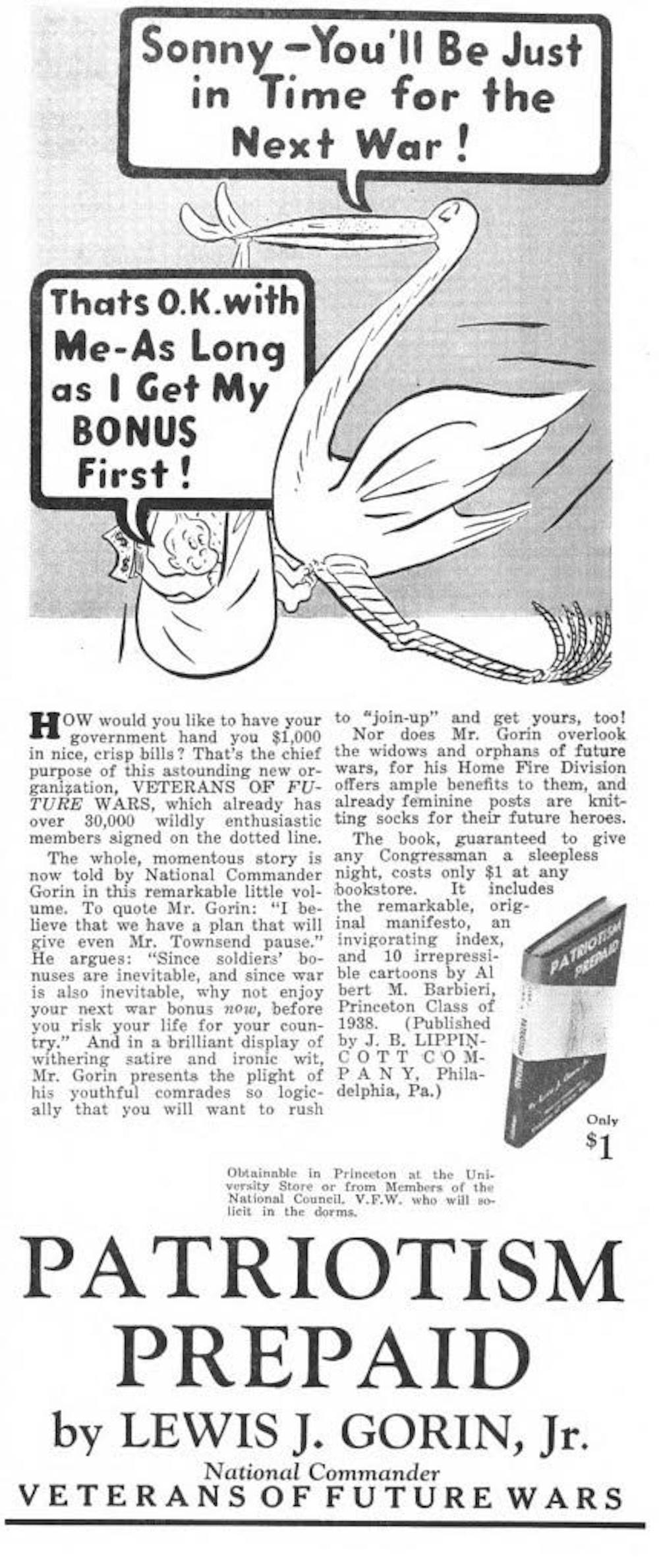In 1936, the Veterans of Future Wars began on the University campus as a joke between a handful of students, but soon exploded into a nation-wide phenomenon before collapsing, all in a little over a year.
Named as a jab at the Veterans of Foreign Wars organization, the Veterans of Future Wars started as a satirical movement protesting the early payout of controversial “soldiers’ bonuses” to World War I veterans, as well as the possibility of the United States entering another war. They argued that, as long as Congress was handing out money, they ought to grant a soldiers’ bonus to every man between the ages of 18 and 35. The VFW reasoned that, since all men in that age group could potentially be drafted and possibly die in future wars, they should receive their bonuses in advance while they were alive to enjoy them.
The movement was sparked in March 1936 when two roommates, Urban Joseph Peters Rushton ’36 and Lewis Jefferson Gorin, Jr., ’36, attended a film screening. Before the film began, the theater played a newsreel reporting on the Adjusted Service Compensation Act (ASCA), which sped up the payment of soldiers’ bonuses (totaling $2 billion) to World War I veterans, or almost $36.5 billion in today’s dollars. This accelerated payout struck Gorin and Rushton as irresponsible, as so many were still suffering from the hardships of the Great Depression.
The two roommates met up with a group of friends and drafted a manifesto, which they published in The Daily Princetonian. At first, the document attracted little notice, but the group continued to publish ads — such as the one above from May 1936 — and newspapers across the country began to publish stories.
Within weeks, what had started as a joke between frustrated students had become a national phenomenon. With the bloody shadow of World War I still looming over the country, the VFW’s cynical anti-war satire resonated with students across the country, who were scared of becoming cannon-fodder in another overseas conflict.
Students at Vassar College attempted to form “the Association of Gold Star Mothers of the Veterans of Future Wars,” a group which would buy any mothers, or potential mothers, “an immediate trip to Europe … to view the future burying places of their present and future children.” The Vassar students’ efforts caused a “firestorm” and were denounced by Vassar President Henry Noble MacCracken as a "breach of good taste.” The campus organizer, Mary Converse, was prohibited from forming an organization by that or any other parody name. Many other university administrations followed suit.
“I don’t think anyone intended for it to be more than a joke,” said Joseph Fronczak, a history professor at the University, who includes the Veterans of Future Wars in his U.S. foreign relations class.
“It’s just so cynical and ironic,” he said, referring to the group’s gloomy message that “war was imminent.”
“They were a little condescending to the press. They were, to some degree, disrespectful of those who disagreed with them. And this is in the 30’s, so you imagine people are wearing suits and smoking pipes by the fire: you expect to be earnest. Instead they were this scathing critique of war, but also of the super-patriotic, worthier-than-thou attitude of some veterans groups who were lobbying for bonuses.”
He added that part of what makes the group so interesting is their lack of a clear political alignment.
“They don’t quite map out as left or right … they weren’t really even isolationists. They were idiosyncratic, politically.”
The movement was not without its critics. Veterans’ organizations condemned them and the group received hate mail calling its members cowards, communists, and Nazis. Representative Claude Fuller of Arkansas denounced the Veterans of Future Wars on the floor of the U.S. Congress, calling the group communist, fascist and pacifist — and the National Legionnaire magazine referred to the group as the “Pansies of Princeton.”

Except for one student who was hurt in an automobile accident, every one of the University students who founded the Veterans of Future Wars served in the armed forces of the United States in World War II.
However, Fronczak asserted that those who thought the VFW was primarily targeting veterans were “missing the mark.”
“To some extent, they were mocking veterans, but their satire was sharper towards the idea of another war,” he explained. “It was directed towards the policy-makers that were going to push the U.S. into another war, one they would have to fight in.”
Fronczak added that he thought University students could learn from the meteoric rise and fall of the VFW, and apply those lessons within their own activism. Although the movement was short-lived — having lost momentum by the summer and disbanded by the spring of 1937 — it is nevertheless an example of a moment in which a group of University students shaped the national conversation and political landscape.
“It’s such a wonderfully intelligent critique, and part of that is that they didn’t take themselves too seriously, which allowed them to not take authority too seriously,” he said.
“Allow people to laugh. There’s a lot of learning in laughter.”









